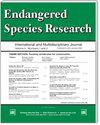Genomic analysis of population history for Hawaiian monk seals
IF 2.9
2区 环境科学与生态学
Q2 BIODIVERSITY CONSERVATION
引用次数: 0
Abstract
ABSTRACT: The Hawaiian monk seal Neomonachus schauinslandi, one of the world’s most endangered pinnipeds, has faced decades of declines and has been the focus of intensive conservation efforts. A myriad of conservation threats has led to range-wide population declines, but population trends among islands can vary widely in response to heterogeneous threats. Populations in the Northwestern Hawaiian Islands have been declining, whereas Main Hawaiian Islands numbers are expanding. Molecular data can provide information to disentangle population structure and dynamics; however, previous studies have yielded insufficient resolution in such a genetically depauperate species. Advances in genomic technology and affordability offer a novel opportunity to revisit questions about Hawaiian monk seal trends with high-resolution markers that provide better discrimination ability in low-diversity species. Here, we investigated region- and island-level population structuring and connectivity. We used BestRAD sequencing on 169 seals from 14 islands that span the archipelago to estimate genetic diversity, genetic differentiation, population structure, and migration rates. We did not find robust evidence for island-level population structure. For the first time, our data set provided resolution to differentiate regional populations with low but significant genetic differentiation. Further, DAPC illustrated population structure with evidence for connectivity, which mirrored our migration rate estimates. Future conservation decisions will need to consider the balance of maintaining connectivity between regions while not homogenizing and losing valuable, yet rare, regional unique variation.夏威夷僧海豹种群历史基因组分析
摘要:夏威夷僧海豹(Neomonachus schauinslandi)是世界上最濒危的针足类动物之一,几十年来一直面临种群数量下降的问题,并一直是密集保护工作的重点。无数的保护威胁导致了整个海域的种群数量下降,但各岛屿之间的种群趋势会因不同的威胁而大相径庭。西北夏威夷群岛的种群数量一直在下降,而主夏威夷群岛的种群数量却在增加。分子数据可以提供信息,以厘清种群结构和动态;然而,对于这种基因贫乏的物种,以往的研究并不能产生足够的分辨率。基因组技术的进步和价格的可承受性为我们提供了一个新的机会,利用高分辨率标记重新审视有关夏威夷僧海豹趋势的问题。在这里,我们研究了区域和岛屿级别的种群结构和连通性。我们使用 BestRAD 测序技术对来自 14 个岛屿的 169 只海豹进行了测序,这些海豹分布于夏威夷群岛的各个岛屿上,我们对它们的遗传多样性、遗传分化、种群结构和迁移率进行了估算。我们没有发现岛屿级种群结构的有力证据。我们的数据集首次提供了区分遗传分化程度低但显著的区域种群的分辨率。此外,DAPC 显示了种群结构的连通性证据,这与我们的迁徙率估计值相吻合。未来的保护决策需要考虑在保持区域间连通性的同时,避免同质化和丧失宝贵而稀有的区域独特变异。
本文章由计算机程序翻译,如有差异,请以英文原文为准。
求助全文
约1分钟内获得全文
求助全文
来源期刊

Endangered Species Research
BIODIVERSITY CONSERVATION-
CiteScore
5.50
自引率
6.50%
发文量
38
审稿时长
31 weeks
期刊介绍:
ESR is international and interdisciplinary. It covers all endangered forms of life on Earth, the threats faced by species and their habitats and the necessary steps that must be undertaken to ensure their conservation. ESR publishes high quality contributions reporting research on all species (and habitats) of conservation concern, whether they be classified as Near Threatened or Threatened (Endangered or Vulnerable) by the International Union for the Conservation of Nature and Natural Resources (IUCN) or highlighted as part of national or regional conservation strategies. Submissions on all aspects of conservation science are welcome.
 求助内容:
求助内容: 应助结果提醒方式:
应助结果提醒方式:


